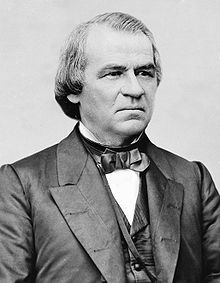

President of the United States
December 29, 1808 Raleigh, North Carolina, U.S.
July 31, 1875(1875-07-31) (66) Elizabethton, Tennessee, U.S.
April 15, 1865 – March 4, 1869
This article is about the 17th U.S. president. For others of that name, see Andrew Johnson (disambiguation). For the 7th president, see Andrew Jackson. 17th president of the United States (1865–69) Andrew JohnsonPortrait by Mathew Brady17th President of the United StatesIn office April 15, 1865 – March 4, 1869Vice President NonePreceded by Abraham LincolnSucceeded by Ulysses S. Grant16th Vice President of the United StatesIn office March 4, 1865 – April 15, 1865PresidentAbraham LincolnPreceded by Hannibal HamlinSucceeded by Schuyler ColfaxUnited States Senator from TennesseeIn office March 4, 1875 – July 31, 1875Preceded by William G. BrownlowSucceeded by David M. KeyIn office October 8, 1857 – March 4, 1862Preceded by James C. JonesSucceeded by David T. PattersonMilitary Governor of TennesseeIn office March 12, 1862 – March 4, 1865Appointed by Abraham LincolnPreceded by Isham G. Harris (as Governor)Succeeded by William G. Brownlow (as Governor)15th Governor of TennesseeIn office October 17, 1853 – November 3, 1857Preceded by William B. CampbellSucceeded by Isham G. HarrisMember of the U.S. House of Representatives from Tennessee's 1st districtIn office March 4, 1843 – March 3, 1853Preceded by Thomas Dickens ArnoldSucceeded by Brookins CampbellMayor of Greeneville, TennesseeIn office 1834–1835 Personal detailsBorn(1808-12-29 ) December 29, 1808 Raleigh, North Carolina, U.S.DiedJuly 31, 1875(1875-07-31) (aged 66) Elizabethton, Tennessee, U.S.Cause of deathStrokeResting placeAndrew Johnson National Cemetery Greeneville, TennesseePolitical partyDemocratic (c. 1839–1864, 1868–1875)Other political affiliationsNational Union (1864–1868)Spouse(s)Eliza McCardle (m. 1827 )Children5Parents Jacob Johnson Mary McDonough ProfessionPoliticiantailorSignatureMilitary serviceBranch/service United States ArmyYears of service1862–1865RankBrigadier GeneralBattles/warsAmerican Civil War Andrew Johnson (December 29, 1808 – July 31, 1875) was the 17th president of the United States, serving from 1865 to 1869. He assumed the presidency as he was vice president at the time of the assassination of Abraham Lincoln. Johnson was a Democrat who ran with Lincoln on the National Union ticket, coming to office as the Civil War concluded. He favored quick restoration of the seceded states to the Union without protection for the former slaves. This led to conflict with the Republican-dominated Congress, culminating in his impeachment by the House of Representatives in 1868. He was acquitted in the Senate by one vote. Johnson was born into poverty in Raleigh, North Carolina, and he never attended school. He was apprenticed as a tailor and worked in several frontier towns before settling in Greeneville, Tennessee. He served as alderman and mayor there before being elected to the Tennessee House of Representatives in 1835. After brief service in the Tennessee Senate, Johnson was elected to the House of Representatives in 1843, where he served five two-year terms. He became governor of Tennessee for four years, and was elected by the legislature to the Senate in 1857. In his congressional service, he sought passage of the Homestead Bill which was enacted soon after he left his Senate seat in 1862. Southern slave states seceded to form the Confederate States of America, including Tennessee, but Johnson remained firmly with the Union. He was the only sitting senator from a Confederate state who did not resign his seat upon learning of his state's secession. In 1862, Lincoln appointed him as Military Governor of Tennessee after most of it had been retaken. In 1864, Johnson was a logical choice as running mate for Lincoln, who wished to send a message of national unity in his re-election campaign; and became vice president after a victorious election in 1864. Johnson implemented his own form of Presidential Reconstruction, a series of proclamations directing the seceded states to hold conventions and elections to reform their civil governments. Southern states returned many of their old leaders and passed Black Codes to deprive the freedmen of many civil liberties, but Congressional Republicans refused to seat legislators from those states and advanced legislation to overrule the Southern actions. Johnson vetoed their bills, and Congressional Republicans overrode him, setting a pattern for the remainder of his presidency. Johnson opposed the Fourteenth Amendment which gave citizenship to former slaves. In 1866, he went on an unprecedented national tour promoting his executive policies, seeking to break Republican opposition. As the conflict grew between the branches of government, Congress passed the Tenure of Office Act restricting Johnson's ability to fire Cabinet officials. He persisted in trying to dismiss Secretary of War Edwin Stanton, but ended up being impeached by the House of Representatives and narrowly avoided conviction in the Senate. He did not win the 1868 Democratic presidential nomination and left office the following year. Johnson returned to Tennessee after his presidency and gained some vindication when he was elected to the Senate in 1875, making him the only former president to serve in the Senate. He died five months into his term. Johnson's strong opposition to federally guaranteed rights for black Americans is widely criticized; he is regarded by many historians as one of the worst presidents in American history.

We use cookies
We use cookies and other tracking technologies to improve your browsing experience on our website, to show you personalized content and targeted ads, to analyze our website traffic, and to understand where our visitors are coming from. Privacy Policy.